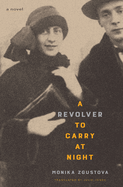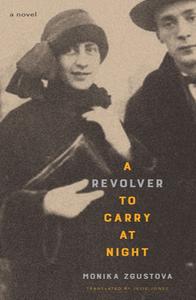
 With A Revolver to Carry at Night, Monika Zgustova (Dressed for a Dance in the Snow) examines the life of a fictionalized Véra Nabokov, necessarily in relation to the famous husband whose career she helped shape. Zgustova offers snippets of the lives of Véra and Vladimir, including both mundane and life-changing moments, alongside their son, Dmitri; Vladimir's one-time lover Irina Guadanini; and the Nabokovs' friend Filippa Rolf. Translated from the Spanish by Julie Jones, this brief but absorbing novel is both terse and expressive.
With A Revolver to Carry at Night, Monika Zgustova (Dressed for a Dance in the Snow) examines the life of a fictionalized Véra Nabokov, necessarily in relation to the famous husband whose career she helped shape. Zgustova offers snippets of the lives of Véra and Vladimir, including both mundane and life-changing moments, alongside their son, Dmitri; Vladimir's one-time lover Irina Guadanini; and the Nabokovs' friend Filippa Rolf. Translated from the Spanish by Julie Jones, this brief but absorbing novel is both terse and expressive.
The novel contains four parts, set in 1977 Montreux; 1937 Cannes; 1964 Boston and New York; and finally Montreux in 1990, following Vladimir Nabokov's death. These nonchronological sections allow for various perspectives on the same events, like the couple's first meeting. In Zgustova's telling, Véra orchestrated the relationship and the marriage from the start. Planning to meet the author at a dance, "[s]he thought that she could only attract a special man like him by doing something original. That's why she had chosen to wear not a delicate, feminine mask but the head of a wolf." The image of the wolf that would indeed intrigue him that night will be evoked again later to describe Véra. A Revolver to Carry at Night is told in a close third-person narrative, shifting perspective among Véra, Vladimir, and others, allowing readers to become engrossed in the various characters' thoughts and feelings.
"She knew that in Russian circles, people said that Véra had coerced Vladimir into marrying her. They may have been right, but... so what? We all create our own lives. If she hadn't organized it, he wouldn't have married her, and with a different wife, he would never have become a famous writer." Véra is "that crazy, marvelous sleepwalker," "a fragile and vulnerable woman," ambitious, complex, controlling, and not necessarily likable. "She knew she didn't have any artistic talent and lacked creative genius... so she decided to realize the work of her life by creating someone whom she could help by fusing with him and becoming part of his creation...." In the absence of her own creative career, she privately takes credit for her contributions to Vladimir's. "She was proud to leave her own mark, although it was small and anonymous, on world literature." The titular revolver is a literal object Véra carries as well as a symbol of her insecurity and tough exterior; it is observed that "Véra would always make sure it was loaded."
Based on events from the Nabokovs' real lives, A Revolver to Carry at Night offers insight as well as imagination into the life of a strong woman who fought for what she wanted. It is not always flattering, but its subject would appreciate the hard-nosed lack of sentimentality. --Julia Kastner, librarian and blogger at pagesofjulia
Shelf Talker: This slim, immersive novel cleverly examines the interior experiences of Véra Nabokov as she supports her famous husband's literary career.

